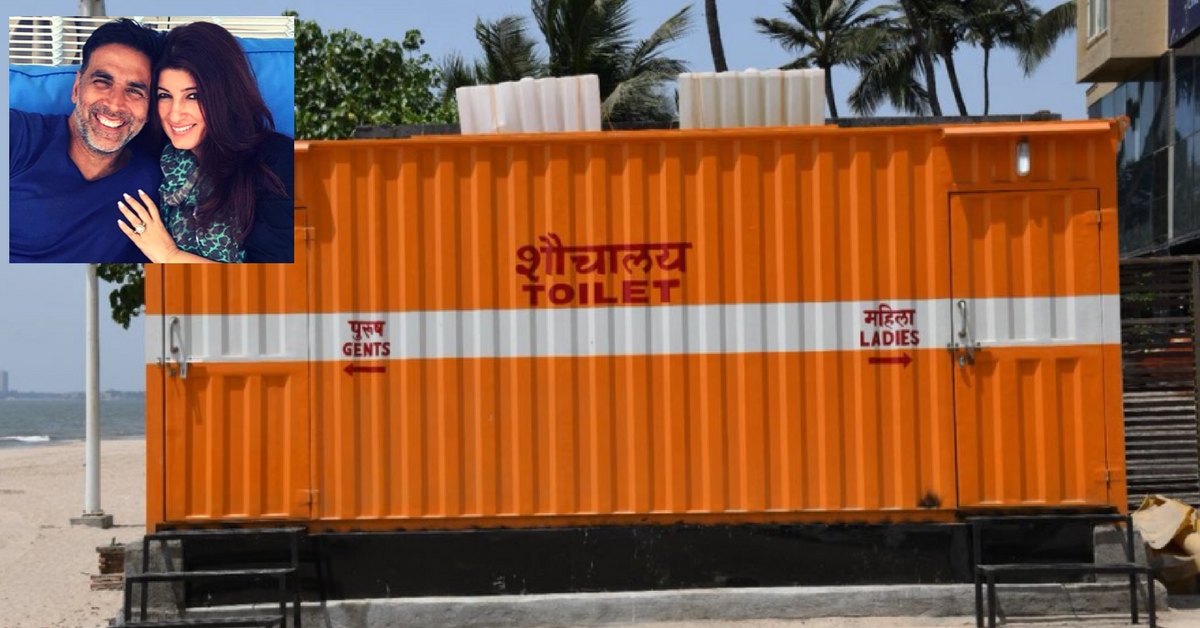8 Months After Twinkle’s Tweet, Akshay Kumar Funds Bio-Toilets at Juhu Beach!
The beach has now been equipped with a row of bio-toilets, thanks to her husband and actor Akshay Kumar - who funded their construction.

In August 2017, the hashtag #WhenYourWalkGoesDownTheToilet trended on Twitter after actor and author Twinkle Khanna tweeted a picture of a man defecating in the open at a distance while she was on her morning walk at Juhu beach.
She captioned it, “Good morning and I guess here is the first scene of Toilet Ek Prem Katha part 2 #WhenYourWalkGoesDownTheToilet”
Though the actor’s tweet was widely retweeted and shared among her huge follower base, it did draw the ire of many Twitteratis who claimed that her tweet was in bad taste and insensitive towards slum-dwellers who were forced by circumstances to openly defecate the beach due to the absence of public toilets.
Eight months later, this tweet seems to have worked in driving action from her own home to solve the open defecation problem at the city’s Juhu beach.
The beach has now been equipped with a row of bio-toilets, thanks to her husband and actor Akshay Kumar – who funded their construction.

Akshay played a crusader against open defecation, struggling to build a toilet for his wife and later his village, in his social film ‘Toilet Ek Prem Katha,’ teamed up with Shiv Sena leader Aaditya Thackeray for the installation of these toilets spending an amount of over Rs 10 lakh.
These bio-toilets are now open for public use reported the Mumbai Mirror.
This public toilet has six seats, three each for men and women, and a separate row of urinals.
Speaking to the publication, Assistant Municipal Commissioner, K-West ward, Prashant Gaikwad said, “The toilets have bio-digester so there will be no stink. The toilets will bring a lot of relief to not just the local slum dwellers, but also to visitors.”
READ MORE: This Award-Winning Bio-Toilet Generates Power & Doesn’t Need Refilling for 15 Years!
Though the number may seem less, it is definitely a start to stop open defecation on the public beaches.
Almost 63% of Mumbai’s population resides in the slums. And though the Swachh Bharat Mission guidelines declare that there should be at least one toilet seat for every 30 users, the city is still short of 60,000 toilet seats to cater to this underprivileged population.
We hope the actor’s action draws the attention of the authorities as well as inspires many more individuals to come forward and contribute to the building of such toilets.
(Edited By Vinayak Hegde)
Like this story? Or have something to share?
Write to us: [email protected]
Connect with us on Facebook and Twitter.
NEW: Click here to get positive news on WhatsApp!

Similar Story

India’s First Vertical Sea Bridge: 8 Things To Know About the New Pamban Bridge
As India’s first vertical lift railway sea bridge, the new Pamban Bridge, is set to reach completion by March next year, here’s some facts you should know about this technological marvel, which connect Rameswaram to mainland India.
Read more >
If you found our stories insightful, informative, or even just enjoyable, we invite you to consider making a voluntary payment to support the work we do at The Better India. Your contribution helps us continue producing quality content that educates, inspires, and drives positive change.
Choose one of the payment options below for your contribution-
By paying for the stories you value, you directly contribute to sustaining our efforts focused on making a difference in the world. Together, let's ensure that impactful stories continue to be told and shared, enriching lives and communities alike.
Thank you for your support. Here are some frequently asked questions you might find helpful to know why you are contributing?


This story made me
-
97
-
121
-
89
-
167












